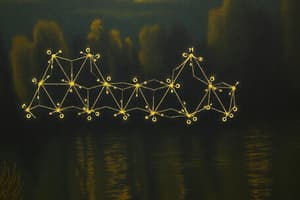Podcast
Questions and Answers
What is the Lewis dot structure for CCl2F2?
What is the Lewis dot structure for CCl2F2?
Answer varies (depends on the drawing)
What is the Lewis dot structure for H2O?
What is the Lewis dot structure for H2O?
Answer varies (depends on the drawing)
What is the Lewis dot structure for OF2?
What is the Lewis dot structure for OF2?
Answer varies (depends on the drawing)
What is the Lewis dot structure for SOCl2?
What is the Lewis dot structure for SOCl2?
What is the Lewis dot structure for CO?
What is the Lewis dot structure for CO?
What is the Lewis dot structure for O3?
What is the Lewis dot structure for O3?
What is the definition of formal charge?
What is the definition of formal charge?
The sum of the formal charges for a molecule must equal its _________.
The sum of the formal charges for a molecule must equal its _________.
What is the Lewis dot structure for CO3^2-?
What is the Lewis dot structure for CO3^2-?
What is Valence Shell Electron Pair Repulsion (VSEPR) Theory?
What is Valence Shell Electron Pair Repulsion (VSEPR) Theory?
What is a bond angle?
What is a bond angle?
What are nonbonding lone pairs?
What are nonbonding lone pairs?
What are double bonds?
What are double bonds?
What is the Lewis dot structure for HCN?
What is the Lewis dot structure for HCN?
What is the Lewis dot structure for SO2?
What is the Lewis dot structure for SO2?
What is the Lewis dot structure for SO3?
What is the Lewis dot structure for SO3?
What is the Lewis dot structure for ClO3^-?
What is the Lewis dot structure for ClO3^-?
What is the Lewis dot structure for ClO4^-?
What is the Lewis dot structure for ClO4^-?
What is the Lewis dot structure for XeF2?
What is the Lewis dot structure for XeF2?
What is the Lewis dot structure for ICl4^-?
What is the Lewis dot structure for ICl4^-?
What must a molecule have to be polar?
What must a molecule have to be polar?
When will molecules containing polar bonds be nonpolar?
When will molecules containing polar bonds be nonpolar?
What are exceptions that are also nonpolar?
What are exceptions that are also nonpolar?
Flashcards are hidden until you start studying
Study Notes
Lewis Dot Structures
- CCl2F2: Each chlorine (Cl) and fluorine (F) bond to carbon (C) with single bonds; carbon has no lone pairs.
- H2O: Oxygen (O) is bonded to two hydrogens (H) with two lone pairs on O.
- OF2: Oxygen is bonded to two fluorines with two lone pairs on O.
- SOCl2: Sulfur (S) is central, bonded to two chlorines and one oxygen, with one lone pair on S.
- CO: Carbon triple bonded to oxygen, with no lone pairs.
- O3: Central oxygen bonded to two outer oxygens with a lone pair on both outer atoms.
- CO3^2-: Carbon double bonded to one oxygen and single bonded to two others; carries a -2 charge.
Formal Charge
- Defined as the hypothetical charge of an atom if electrons were shared equally in covalent bonds.
- The sum of formal charges in a molecule equals its overall charge.
Valence Shell Electron Pair Repulsion Theory (VSEPR)
- Electron pairs in the valence shell repel each other, influencing molecular shape.
- Used to predict shapes from Lewis dot structures.
Bond Angles
- Defined as the angle formed between the nuclei of surrounding atoms and the central atom.
Nonbonding Lone Pairs
- Lone pairs repel bonding pairs more strongly than bonding pairs repel each other, reducing bonding pair angles.
Double Bonds
- Have increased electron density compared to single bonds, impacting repulsion and bond angles.
Molecular Polarity
- For a molecule to be polar, it must contain at least one polar covalent bond and have non-canceling bond dipoles.
- Molecules with polar bonds may be nonpolar if all electron groups are bonding groups and surrounding atoms are identical.
Nonpolar Molecule Exceptions
- Trigonal bipyramidal linear and square planar octahedral molecules can be nonpolar despite the presence of polar bonds.
Studying That Suits You
Use AI to generate personalized quizzes and flashcards to suit your learning preferences.



